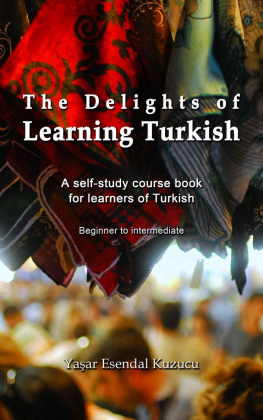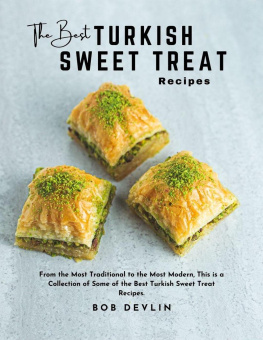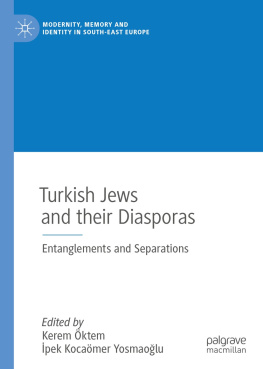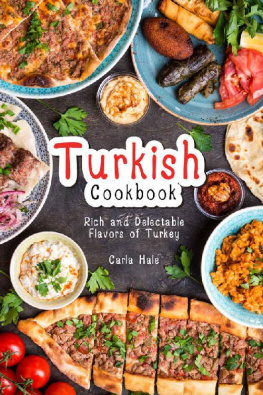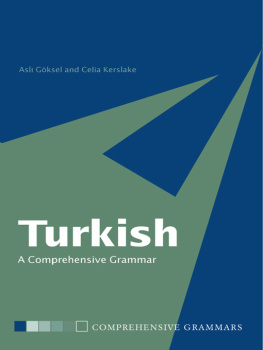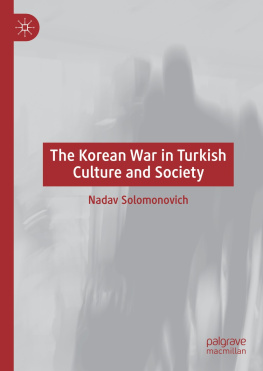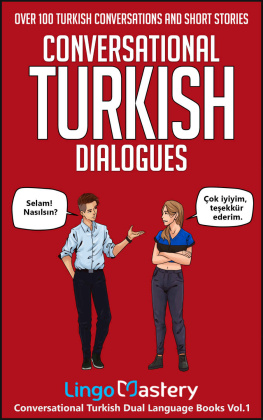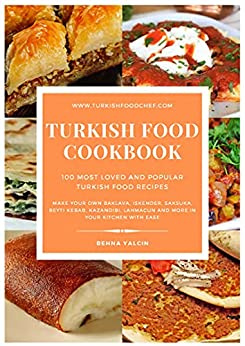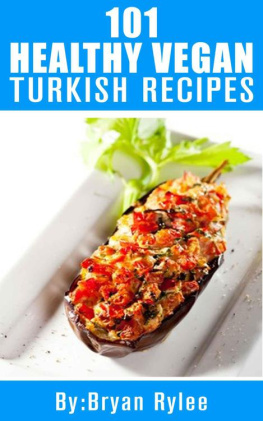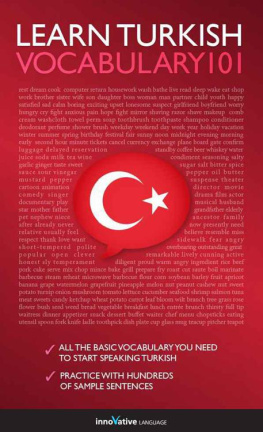
Copyright 2013, Yaar Esendal Kuzucu. All rights reserved. No part of this publication may be reproduced or transmitted in any form or by any means, electronic or mechanical, including photocopy, recording, or any information, storage and retrieval system, without permission in writing from the publisher and copyright owner. UK Copyright Service.
Cover photo: Depositphotos.com/reflextions

Acknowledgements
I would like to say thank you to Douglas Parkhill for proofreading and editing my book.
I would also like to say thank you to my wife Shirley for her support and help.
And I would like to say thank you to Rob Parkinson for his support.
Contents
greetings; asking name, nationality; asking where someone lives; asking what someone's job is; personal pronouns; the verb 'to be' (am, is, are) ; indefinite article 'a' and 'an' ; the numbers; plurals; making simple sentences Merhaba! Naslsnz? Hello! How are you? yi gnler. Adnz ne? Good day. What is your name? Nerelisiniz? Where are you from? Milliyetiniz ne? What is your nationality? Nerede oturuyorsunuz? Where do you live? Ne i yapyorsunuz? What is your job? verbs; the infinitive form of a verb; present continuous tense; what is happening now; time expressions; how to address people; words used in daily language Ho geldiniz Welcome Bu ne? What is this? Bu kim? Who is this? imdi ne yapyorsun? What are you doing now? using the language when shopping; prepositions 'to' , 'at' and 'from' ; vowel harmony; types of suffixes and the rules for using them; the days of the week; the months of the year; the seasons; question words; how to describe people; asking and telling the time Alveri Shopping Nereden geliyorsun? Where are you coming from? Nereye gidiyorsun? Where are you going? Ka yandasn? How old are you? Saat ka? What is the time? how to say Mr, Mrs, Miss, Ms in Turkish; adverbs of frequency; saying how and how often we do things; countries, nationalities and languages; imperative statements and making commands; making informal suggestions; adjectives; making adjectives with suffixes; how to describe things; colours; asking and giving directions Altan Bey ve Aye Hanm Mr San and Mrs San Tiyatroya ge kalyoruz We are late for the theatre Caddede In the street Alveri merkezinde At the shopping mall the past tense; how to tell about what we did in the past; how to say 'I have done' in Turkish; time expressions for the past tense; the past form of the verb 'to be' (was, were) ; more on daily language Geen yaz nereye gittiniz? Where did you go last summer? Dn neler yaptn? What did you do yesterday? Hi Amerika'ya gittin mi? Have you ever been to America? Dn ok gzel bir gnd Yesterday it was a very nice day the subjunctive mood ; making suggestions; to offer to do something; quantity words; ordering a meal at a restaurant; food names and some basic Turkish meals; auxiliary verbs in Turkish; occupations; demonstrative pronouns: this, that, these, those Yardm edeyim mi? Shall I help? Bir telefon konumas A telephone conversation Lokantada At a restaurant using nouns in Turkish; hard and soft consonants and consonant changes; compound nouns/noun completions; possessives; how to say something belongs to you; possessive adjectives; how to say telephone numbers; possessive pronouns; reflexive pronouns; how to say 'by myself' ; verb 'to have' in Turkish Tren istasyonunda At the train station Benim evim ok gzel My house is very beautiful Hale, Ekrem'e adresini ve telefon numarasn sordu Hale asked Ekrem his address and telephone number future tense; talking about the future; talking about the weather; the cardinal points; adverbs; describing how and in what manner we do things; future form of 'to be' (am, is, are) Yarn yamur yaacak m, yamayacak m? Will it rain or will it not rain tomorrow? Bugn kendimi tuhaf hissediyorum I feel weird today direct object of a verb; accusative case; how to use 'the' in Turkish; word order in a Turkish sentence; object pronouns; cases of personal pronouns, nouns and demonstrative pronouns; how to use the buffer letters Kapy kilitledim mi? Have I locked the door? the simple present tense; expressing general facts, daily, habitual or repeated actions; to express willingness to do something; making a polite request; how to request somebody to do something; to offer something to somebody; to talk about uncertain future; to tell stories and jokes; the habitual past; to talk about what we used to do; grammar explanations Postane nerede syler misin ltfen? Would you please tell me where the post office is? Bu dolmu nereye gider? Where does this shared taxi go? ocukken neler yapardk? What did we use to do when we were children? making adjectives from verbs; how to use 'which', 'who', 'that' in Turkish; present, past and future participles as adjectives; how to report events (reported speech) Otobs duranda bekleyen adam gryor musun? Do you see the man waiting at the bus stop? the inferential; using 'apparently' in Turkish; talking about indefinite past; reporting what somebody else has said; prepositions of place; grammar points; telling jokes and stories; telling an address Aye bir adamla tanm Apparently, Aye met a man Pazara nasl giderim? How do I go to the bazaar? 'if' forms of verbs; conditional sentences in different tenses; regretting; wish clauses; compare Turkish and English sentences; marital status; family members Eer erken kalkacaksanz uyandralm m? If you are going to get up early, shall we wake you up? verbal noun; how to make nouns from verbs; 'have to' ; 'must' ; expressing obligation; necessity; need; talking about the things we like or dislike Yrmeyi seviyorum I like walking Grlt yapmamalsn You mustn't make a noise comparative and superlative forms of adjectives; making comparisons; giving advice; indefinite pronouns; making recommendations Bugn daha iyiyim I am better today to be able to do something; 'can', 'may', 'might' ; passive construction; talking about the future in the past; the causative form of the verb Trke konuabiliyor musun? Can you speak Turkish? Osman'n evi soyuldu Osman's house has been burgled talking about what we were doing in the past (the past continuous tense); past perfect tense (past in the past); participles in different constructions; 'would' ; foreign words in Turkish vocabulary; a brief history of Turkey; about Mustafa Kemal Atatrk Tam kyorduk yamur yamaya balad Just as we were going out, it started to rain Mustafa Kemal Atatrk ve modern Trkiye Cumhuriyeti Mustafa Kemal Atatrk and the modern Republic of Turkey
About the author
Yaar Esendal Kuzucu has extensive experience of teaching and lecturing in both English and Turkish. He taught English at high school and Ankara University before setting up courses for learners of Turkish in Turkey.
He has translated novels from English to Turkish including Jonathan Livingston Seagull by Richard Bach ( Mart , published 1994), Of Mice and Men by John Steinbeck ( Fareler ve insanlar , published 1995) and The Zrau Aphorisms by Kafka from its English edition ( Aforizmalar , published 1997). He has also written a series of storybooks for children in English and grammar books for students of English in Turkey (published 1996).
He is currently an interpreter and linguist living in England where he has continued his own Turkish classes.
Introduction
If you want to communicate really effectively in a Turkish environment, you need more than a phrase book. What you will need to begin to develop is a grasp of the very different grammar and sentence construction of this rich and fascinating language. This is what this book will give you and whether you are planning to settle and live in Turkey itself or are visiting regularly for business or pleasure, studying what is presented here can deepen your experience immeasurably. It takes you from the beginner level to the intermediate level in Turkish. You will be able to construct your own sentences instead of depending on off-the-shelf phrases. More than that, it will introduce you to a culture and tradition.
Next page
